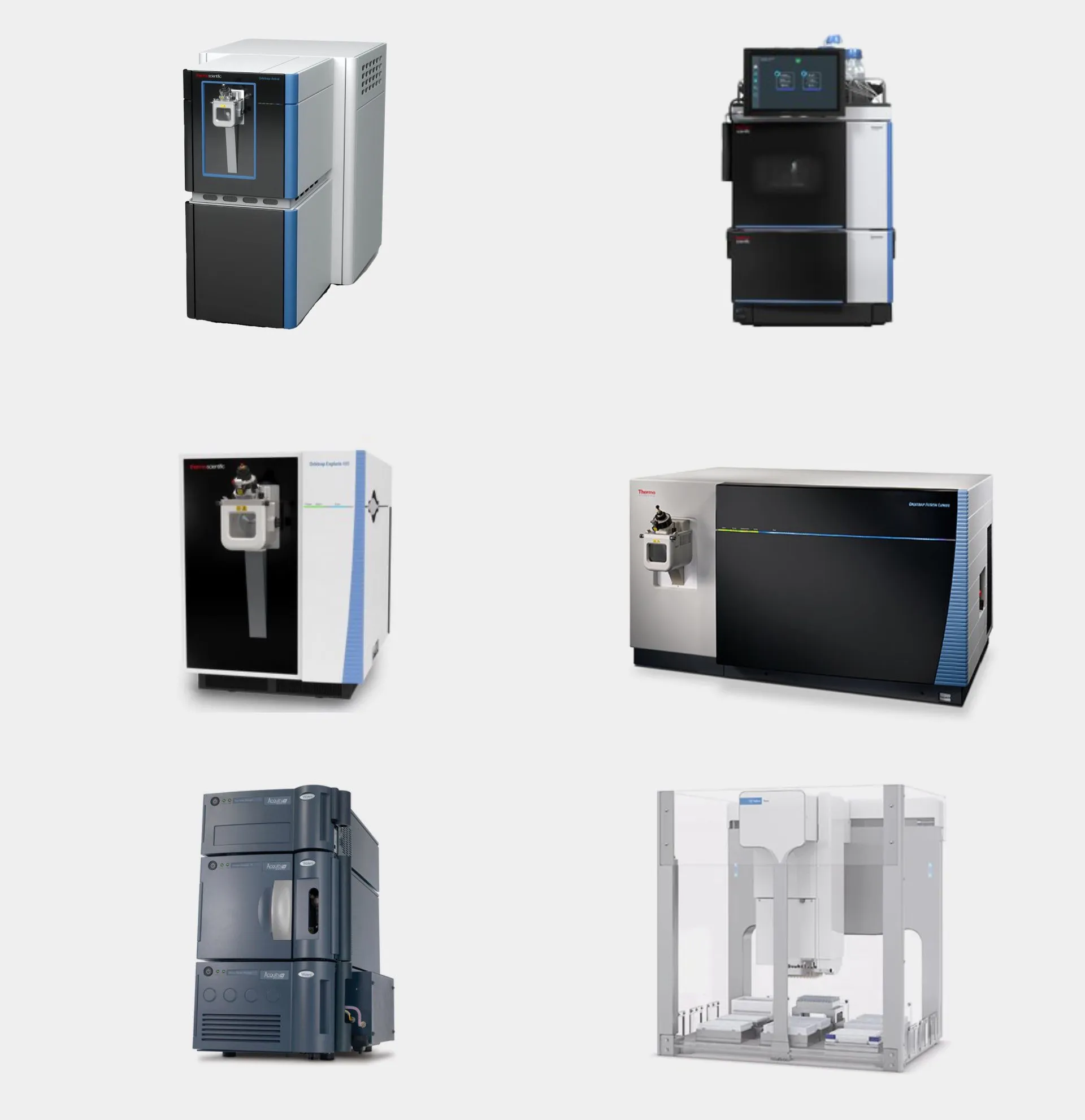Instrumentation
MS Bioworks uses ThermoFisher Orbitrap platforms with nanoscale liquid chromatography systems for all projects. This is industry leading instrumentation employed by many academic thought-leaders. We currently have three Orbitrap Fusion Lumos, one Exploris 480 and one Q Exactive mass spectrometers.
The Orbitrap Astral Mass Spectrometer
The Orbitrap Astral Mass Spectrometer combines three mass analyzers: a quadrupole mass analyzer for high selectivity and high ion transmission; an Orbitrap mass analyzer for high dynamic range and high-resolution measurements; and a novel Astral analyzer for fast and sensitive measurements. The front end, from the ion source up to the segmented quadrupole mass filter, is designed to maximize instrument sensitivity and robustness. Ions are trapped and concentrated in the ion routing multipole, which facilitates the transfer of ions to either of the high-resolution accurate-mass (HRAM) analyzers. Synchronization of ion transfer and processing throughout the instrument enables the parallel handling of five separate ion packets simultaneously. This synchronization enables each mass analyzer to be used in combination to optimize performance and experimental flexibility.
- The Astral Mass Analyzer delivers high acquisition rates up to 200 Hz, single ion detection sensitivity, and high dynamic range HRAM SIM and MS2 measurements that are fully synchronized with parallel Orbitrap analyzer operation.
- The Orbitrap Astral Mass Spectrometer excels at many data acquisition strategies including High Resolution Data-Independent Acquisition (HR-DIA) and data-dependent acquisition (DDA).
- Capable of accurate and precise quantitation using either Label-Free Quantitation (LFQ) or multiplexing with Tandem Mass Tag (TMT)-labeled peptides.
The Orbitrap Exploris 480
The latest addition to the MS Bioworks fleet of instruments. This mass spectrometer has unique capabilities which impart extra speed, depth, and certainty to enable you to run more experiments or to gain deeper insights into your research. Instrument performance highlights include:
- 480,000 Max Resolution
- Up to 40 Hz scan speed
- m/z 40 to 8000 mass range
- >5000:1 dynamic range
- Broader range of experiments with multiple scan modes: data-dependent acquisition (DDA), data independent acquisition (DIA), spectral multiplexing (MSX), TopN and new TopSpeed (TopS), BoxCar DIA and DDA experiments, tSIM, tSIM MSX, ddMS/MS, targeted MS/MS
Orbitrap Fusion Lumos Tribrid
Our Orbitrap Fusion Lumos Tribrid mass spectrometers are the industry-leading high-performance mass spectrometers. Our systems are equipped with HCD, CID and ETD fragmentation.
- Tribrid architecture — includes quadrupole mass filter, linear ion trap and Orbitrap mass analyzers
- Ultrahigh resolving power up to 500,000 FWHM
- Full parallelization of MS and MSn analyses
- Synchronous Precursor Selection (SPS) for MS and MSn experiments significantly increases the number of peptides and proteins identified and improves quantitative accuracy when using isobaric mass tags
- Flexibility of fragmentation — CID, HCD, ETD and EThcD available at any stage of MSn
Q Exactive
Our Q Exactives are hybrid quadrupole-Orbitrap mass spectrometers combining a high-performance quadrupole mass filters with the industry leading high resolution sensitive and selective Orbitrap mass analyzer. This instrument is ideal for discovery proteomics, quantitative proteomics and PTM related work.
Combining this instrumentation with sample processing workflows developed and optimized by our scientists over many years and high-end data processing technologies enables MS Bioworks to address the complex analytical problems arising from modern biological research. MS Bioworks operators are dedicated professional scientists who understand the importance of their client’s research and are accountable for uncompromising data quality delivered with high integrity and transparency.
Identify, quantify and confirm with unmatched confidence using the Q Exactive mass spectrometer.
- Resolving power up to 140,000
- Maximum scan speed 12 Hz
- Intra-scan dynamic range > 5000:1
- Quadrupole mass filter
- Spectral multiplexing for enhanced duty cycle
- S-Lens ion source for increased sensitivity
Data Analysis
MS Bioworks uses Mascot, Scaffold, MaxQuant, Perseus, Byonic and Skyline packages for data processing and review.

MS Bioworks uses the Mascot database search engine to identify proteins from primary sequence databases. Mascot is developed and distributed by Matrix Science Ltd, to find out more about how Mascot enables the confident identification of peptides and proteins from complex LC-MS/MS datasets visit the Matrix Science homepage here.
MS Bioworks uses the Scaffold data processing software to visualize and mine database search results. Our clients can view their data using the free Scaffold viewer appropriate for their operating system. Scaffold is developed and distributed by Proteome Software, for more information about Scaffold and the option to download the free data viewer visit the Proteome Software website here.

MS Bioworks is using Protein Metrics Byonic software to expand our glycoproteomics and PTM identification and localization workflows. For more information on Byonic and their new approach to database searching for the identification of modified peptides and proteins visit the Protein Metrics website.


MaxQuant and Perseus are quantitative proteomics tools for analyzing large scale mass spectrometric data sets. MaxQuant with the Andromeda search engine enables protein identification and quantitation. Perseus enables statistical analysis of the MaxQuant output. You can find out more about MaxQuant here.


